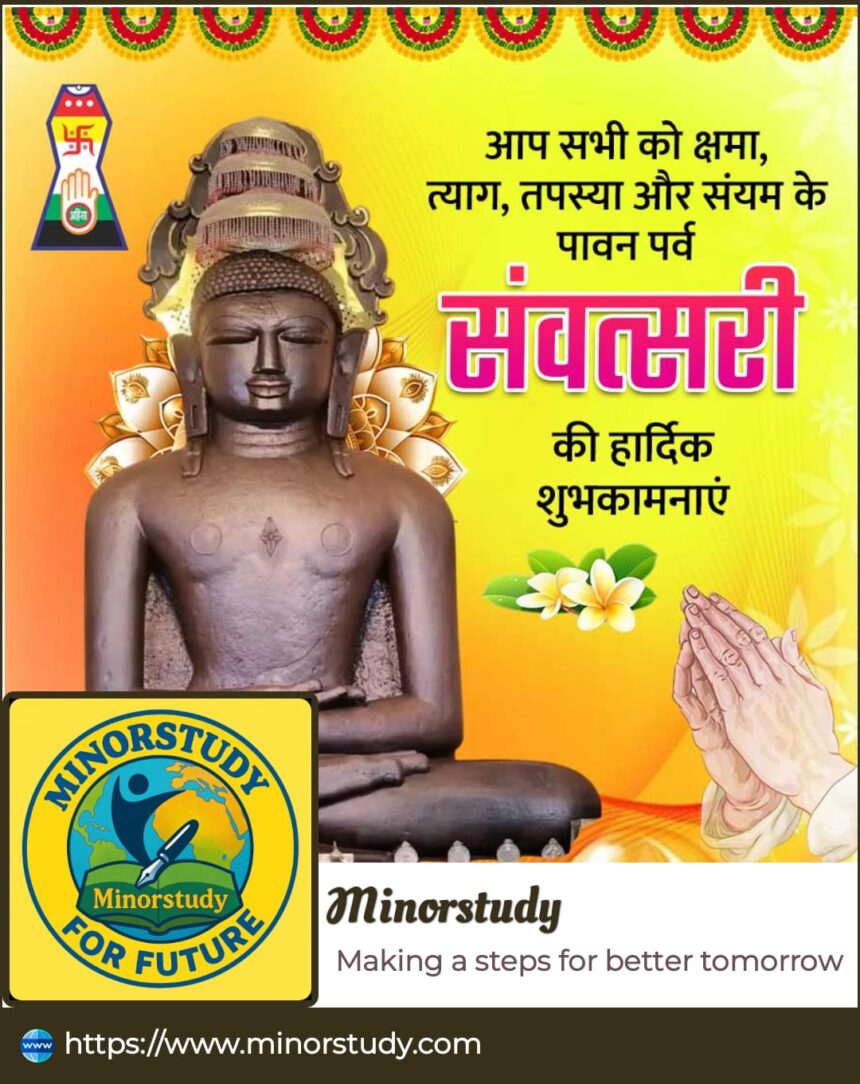🌼 Introduction
Every culture has festivals that go beyond rituals and touch the very soul of humanity. For Jains, Samvatsari is one such festival—a day of forgiveness, reconciliation, and spiritual renewal. Known as the Festival of Forgiveness, it marks the most important day of Paryushana Parva, observed mainly by the Shwetambar sect of Jainism.
- 🌼 Introduction
- 📜 History of Samvatsari
- 🕰️ Timeline of Samvatsari and Its Evolution
- 🌟 Important Facts about Samvatsari
- 🙏 Observance of Samvatsari
- 🌍 Significance of Samvatsari in Modern Life
- 🌼 Wishing on Samvatsari
- 🔑 Important Points at a Glance
- 📚 FAQs about Samvatsari
- 🌸 Daily Life Impacts of Samvatsari
- 🌺 Conclusion – A Festival for the Soul
Samvatsari is not just a religious observance; it is a universal human lesson in humility, compassion, and letting go of grudges. Whether you are Jain or not, the values of Samvatsari can deeply impact your personal relationships, social harmony, and mental peace.
This article explores Samvatsari’s history, timeline, facts, FAQs, significance, wishes, and daily life impacts in over 1800 words—written with a human-friendly touch so it feels more like a conversation than a lecture.
📜 History of Samvatsari
The origins of Samvatsari are rooted in ancient Jain traditions. Jainism, one of the world’s oldest religions, emphasizes Ahimsa (non-violence), Satya (truth), Aparigraha (non-possession), and forgiveness.
Paryushana Festival: Samvatsari falls on the last day of Paryushana, a spiritual festival of reflection, fasting, and self-discipline.
Mahavira’s Teachings: The tradition comes from Lord Mahavira, the 24th Tirthankara, who taught that forgiveness (Kshama) purifies the soul and removes karmic bondage.
Micchami Dukkadam: On this day, Jains ask for forgiveness by saying “Micchami Dukkadam”—which means “May the bad deeds (done knowingly or unknowingly) be forgiven.”
This annual observance thus became a cultural and spiritual reset button, encouraging people to start fresh with peace and compassion.
🕰️ Timeline of Samvatsari and Its Evolution
6th Century BCE: Lord Mahavira emphasizes forgiveness as a central spiritual practice.
Ancient Times: Jain monks and householders begin observing an annual day of forgiveness during Paryushana.
Medieval Period: The tradition spreads across India, with Micchami Dukkadam becoming a ritual greeting.
Modern Era: Samvatsari gains recognition beyond Jain communities as a universal practice of peace.
21st Century: In the age of digital connections, Jains worldwide send Micchami Dukkadam messages through calls, emails, and social media.
🌟 Important Facts about Samvatsari
Festival of Forgiveness: It is considered the most sacred day in the Jain calendar.
Micchami Dukkadam: The central practice of seeking forgiveness, even from strangers.
Fasting Tradition: Many Jains observe a full day of fasting to purify the body and soul.
Global Observance: Jains living abroad also celebrate, spreading its values worldwide.
Beyond Religion: Its message of forgiveness is universal, making it relevant to all communities.
Inner Cleansing: It is not just about apologizing to others but also about self-reflection.
Annual Spiritual Reset: It is like a “spiritual New Year” for Jains, where grudges are left behind.
🙏 Observance of Samvatsari
Samvatsari rituals include:
Pratikraman: A special prayer session for repentance and reflection.
Fasting: Many Jains go without food or take only boiled water for the day.
Forgiveness Ritual: Saying “Micchami Dukkadam” in person, through letters, or modern technology.
Community Bonding: Families, friends, and communities come together to seek forgiveness.
Charity: Acts of kindness and donations are performed to promote compassion.
This ritualistic structure ensures that forgiveness is not just spoken but felt and practiced deeply.
🌍 Significance of Samvatsari in Modern Life
The relevance of Samvatsari goes far beyond religious observance. In today’s world of stress, competition, and conflicts, its lessons are timeless:
Emotional Healing: Forgiveness reduces anger, bitterness, and emotional burden.
Strengthening Relationships: Saying sorry can mend broken bonds.
Mental Peace: Letting go of grudges improves mental health.
Social Harmony: Communities thrive when forgiveness replaces conflict.
Spiritual Growth: Forgiveness cleanses the soul and nurtures humility.
Simply put, Samvatsari is not about forgetting the past but about freeing yourself from its chains.
🌼 Wishing on Samvatsari
On Samvatsari, Jains greet each other with the phrase:
✨ “Micchami Dukkadam” – “If I have caused you any harm, knowingly or unknowingly, with my thoughts, words, or actions, I seek your forgiveness.”
You can wish others in simple words like:
“May this Samvatsari bring peace and forgiveness into your life.”
“On this Samvatsari, I ask for your forgiveness for any mistakes I may have made.”
“Micchami Dukkadam – Let’s start fresh with love and understanding.”
These wishes promote genuine reconciliation and emotional healing.
🔑 Important Points at a Glance
Samvatsari = Day of Forgiveness in Jainism.
Celebrated on the last day of Paryushana Parva (mainly by Shwetambar Jains).
Central practice: Micchami Dukkadam (seeking forgiveness).
Practices: fasting, prayer, reflection, and charity.
Significance: emotional, spiritual, and social healing.
Universality: Its message applies to all humans, beyond religion.
📚 FAQs about Samvatsari
Q1. What is the meaning of Samvatsari?
Samvatsari is the Jain Festival of Forgiveness observed on the last day of Paryushana.
Q2. Why do Jains say Micchami Dukkadam?
It is a way of seeking forgiveness for any harm caused knowingly or unknowingly.
Q3. Who celebrates Samvatsari?
It is primarily celebrated by Shwetambar Jains, though its values are universal.
Q4. Is fasting compulsory on Samvatsari?
No, but many Jains voluntarily fast for self-purification.
Q5. How is Samvatsari relevant to non-Jains?
Its values of forgiveness, compassion, and peace apply to every human being, regardless of religion.
🌸 Daily Life Impacts of Samvatsari
In Families: Creates stronger bonds by clearing misunderstandings.
In Workplaces: Promotes teamwork and reduces conflicts.
In Society: Encourages compassion and reduces violence.
In Mental Health: Lowers stress, anxiety, and emotional baggage.
In Spirituality: Helps individuals grow with humility and love.
Samvatsari’s practice of forgiveness can literally change the way we live, love, and connect.
🌺 Conclusion – A Festival for the Soul
Samvatsari is more than a ritual. It is a philosophy of life.
In a world filled with anger, misunderstandings, and grudges, the message of Samvatsari—“Micchami Dukkadam”—comes like a breath of fresh air. It tells us that true strength is not in holding on, but in letting go.
By observing Samvatsari, whether you are Jain or not, you choose to:
Forgive others for their mistakes.
Seek forgiveness for your own.
Begin anew with peace in your heart.
That is why Samvatsari is not just for Jains—it is for all of humanity.
🌿 Let us live by its spirit daily, not just once a year.








